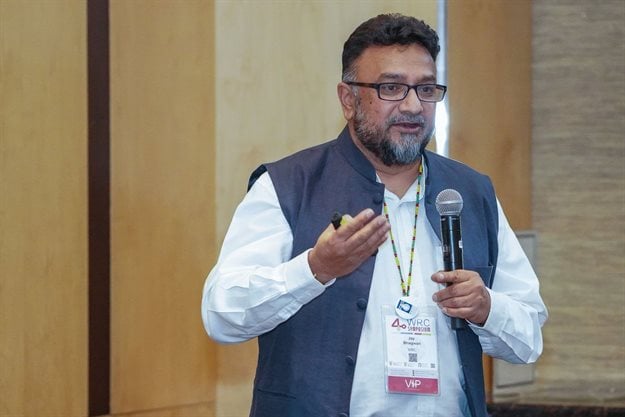There has been a lot of concern and complaints but very few solutions for our water-stressed country that's coupled with perverse water-use behaviours. Consumption and inequitable water access result as a consequence of providing high assurance and high quality of water to a privileged percentage of the population who have become ignorant to our circumstances.

Jay Bhagwan, executive manager, Water Research Commission
As South Africa and the government, we live through a water crisis daily and one which we have continually managed to abate. Changing climate and new extreme weather events, together with growing population and poor water use behaviour puts greater pressure on our water management and security. There are many new solutions such as harvesting, reuse, reducing leaks etc. to alleviate this challenge. However, more radical and disruptive interventions are required – these being behaviour change in water usage and new non-sewered sanitation (or off-grid sanitation). These kinds of interventions are required to “future proof our water security”, as aptly put by Dhesigen Naidoo, CEO of Water Research Commission.
Pressure on an already constrained resource
With current conventional sanitation and sewerage systems associated with the 'flush', we are using anywhere between 30-60% of all household water consumption. This practice of moving large amounts of human wastes using fresh treated water puts pressure on an already constrained water resource environment. Not only does it become unsustainable, but also contributes to water quality challenges through the introduction of new pollutants. At present, many parts of the country are experiencing heatwave conditions and there are some areas where water supply is constrained. In these circumstances, current sanitation approaches become extremely vulnerable.
Herein lies the greatest opportunities of the “brown revolution”. The ability to disrupt 'flush' practices through new non-sewered sanitation solutions offers the opportunity to release and contribute nearly 30-60% water to the resource, and thereby improve both water and sanitation security. The additional benefits relate to closing a pollution pathway which so seriously affects the environment, extension of capacity of existing infrastructure, and possibly a reduction in need for new and larger infrastructure.
Part of a circular economy
Further, new non-sewered sanitation will have the elements of a circular economy which will see human waste as a resource, which allows a whole ecosystem of beneficiation to be derived from processing, by-products and servicing models which support self-sustaining businesses. It will have a catalytic effect of stimulating and developing a series and variety of logistics and supply chain models which brings greater convenience to the user/customer and the much-required capacity which is a weakness in the public model. There are already many of these initiatives in application where human wastes are being turned into valuable products such as biochar, oil, protein and fertilisers. This resource approach opens up these new opportunities for a sanitation economy.
Leading this ‘brown revolution’ in South Africa is the Water Research Commission under the banner of The Sanitation Transformation Initiative – known under the acronym SaniTI – an approach conceptualised by the WRC which aims to disrupt the current sanitation paradigm by presenting a new pathway and a national strategic direction for the South African sanitation industry for various partners and stakeholders to break away from the current engineering and economic paradigm to a more water secure paradigm.
South African Sanitation Demonstration Programme
As part of the build-up and contribution to World Toilet Day on 19 November, the WRC and its partners, DSI, DHSWS, SABS, DTI with the support of the Bill and Melinda Gates Foundation, is launching the South African Sanitation Demonstration Programme (SASTEP) on 14 November. SASTEP will support and accelerate the application and uptake of the latest cutting-edge toilets through evidence-based policy adjustments, demonstration, testing and science-based improvements towards localisation and industrialisation. This includes technologies supported by the Bill and Melinda Gates Foundation’s “Reinvent the Toilet” programme. The revolutionary toilet systems will offer water-saving or water-recycling features, be aspirational in design, and, more importantly, offer dignity and convenience.
This is our contribution to South Africa and the developing world towards closing the sanitation backlogs by creating the platform for leapfrogging these solutions in growing urban cities and rural areas of the developing world. This bold and ambitious attempt will transform sanitation into the future and will be the new gold standard enabling universal access to sanitation.
It is upon all of us to agitate for this ‘brown revolution’; however, it is important to prepare our people for such a revolution lest we become a group of sanitation rebels. We need a common message with many voices. The sanitation evolution has taken us thus far, now is the time for the sanitation ‘brown’ revolution to take us to the future.
















































